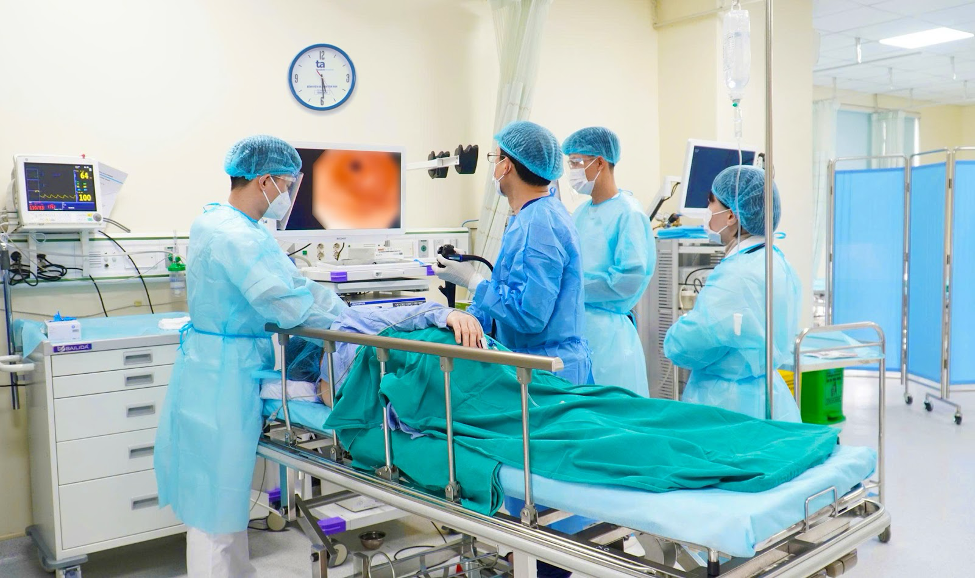Vu was diagnosed with ulcerative colitis last year. He stopped taking his medication when his symptoms subsided. Recently, he experienced increased rectal bleeding, with up to 20 episodes a day, leading to significant weakness. He sought treatment at Tam Anh General Hospital in Hanoi. A colonoscopy revealed severe inflammation and ulceration extending to the splenic flexure, a narrowing of the left colon, and multiple deep ulcers.
On 30/6, Dr. Ha Thi Loan from the Department of Gastroenterology stated that Vu was at risk of developing toxic megacolon, colon perforation, and multiple organ failure, all life-threatening complications. Severe acute ulcerative colitis is a dangerous condition with a high mortality rate if not treated promptly. Typically, patients receive intravenous corticosteroids, but Vu was no longer responsive to this treatment upon admission.
Doctors implemented an aggressive treatment plan including fluid resuscitation, prophylactic measures for blood clots, broad-spectrum antibiotics, and biologics administered intravenously. According to Dr. Loan, if severe ulcerative colitis with acute bleeding is not treated promptly and correctly, patients may require a total colectomy, significantly impacting their quality of life.
Modern treatment protocols incorporating biologics offer patients a chance for faster recovery and reduced complications. Biologics are a new class of drugs that selectively modulate the immune system, directly targeting and rapidly controlling excessive inflammatory responses, the underlying cause of deep ulcers and bleeding in the colon lining.
"Biologics are effective in treating severe ulcerative colitis cases that no longer respond to traditional methods," said Dr. Loan. She added that unlike corticosteroids and traditional immunosuppressants, which cause widespread immune suppression, biologics are targeted, reducing inflammation quickly and minimizing systemic side effects. This allows for faster recovery and reduces the need for a colectomy. Treatment with biologics should be administered and closely monitored by a specialist to ensure safety and efficacy. Patients should not self-medicate or discontinue treatment prematurely.
Following the biologic treatment, Vu's condition improved. His bowel movements decreased, the blood in his stool reduced, his fever subsided, and he was discharged. At his one-month follow-up appointment, he reported regular bowel movements, weight gain, and stable health. A colonoscopy showed significant healing of the colon lining, and he was able to resume normal activities.
 |
A doctor performs a colonoscopy. Photo illustration: *Tam Anh General Hospital* |
Ulcerative colitis is a chronic inflammatory condition of the colon and rectum lining, causing ulcers and bleeding, often progressing in episodes. Severe acute ulcerative colitis with bleeding is the most severe form of this disease.
Ulcerative colitis is prone to recurrence, requiring patients to adhere to prescribed medications and dosages, refrain from self-discontinuation or medication changes, and attend regular follow-up appointments for monitoring and treatment adjustments.
While complete recovery from ulcerative colitis is challenging, patients can maintain stable health through effective medication management and a healthy lifestyle. This includes a bland diet, avoiding spicy, fatty, and processed foods, alcohol, and potential irritants like dairy, acidic foods, and coffee. Eating smaller, more frequent meals, consuming cooked food and boiled water, maintaining a relaxed mindset, managing stress, and engaging in light exercises like walking or yoga can further support digestion and overall health.
Ly Nguyen
*The patient's name has been changed*












